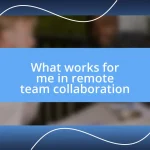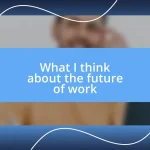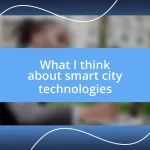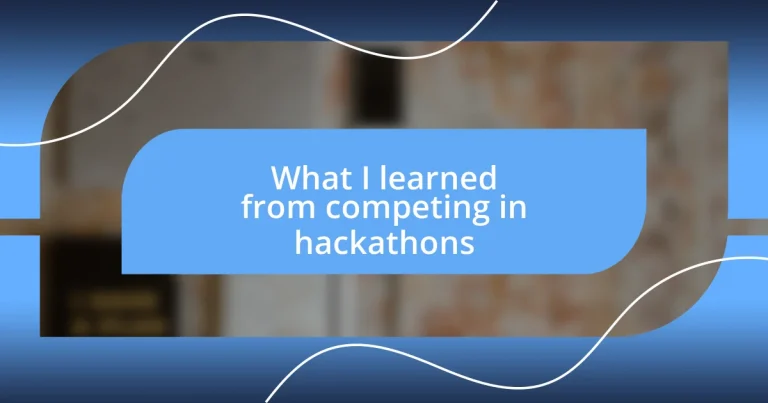Key takeaways:
- Hackathons foster collaboration with diverse teams, enhancing creativity and perspective through shared insights and skills.
- Participants develop critical skills such as adaptability, problem-solving, and effective communication while navigating challenges under pressure.
- Networking opportunities in informal settings can lead to mentorships and professional connections that support future career endeavors.
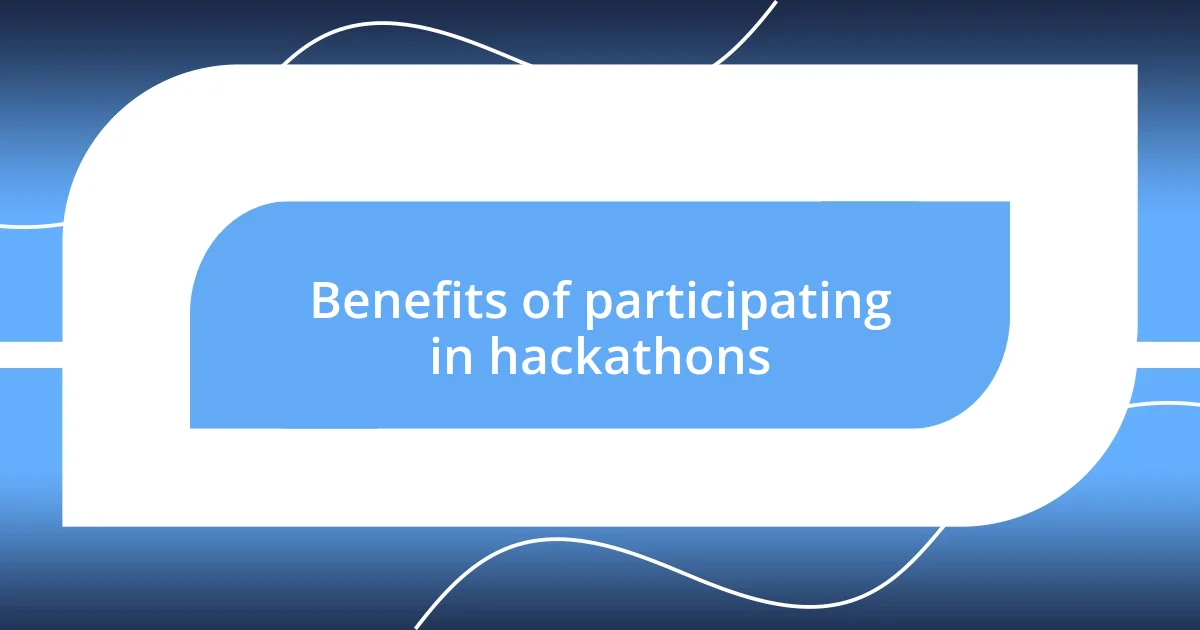
Benefits of participating in hackathons
Participating in hackathons has been a transformative experience for me. One of the standout benefits is the opportunity to collaborate with diverse teammates. I remember my first hackathon vividly; I teamed up with people from different backgrounds—some were coders, others designers, and even a marketing guru. This blend of skills opened my eyes to new perspectives and ideas that I would never have encountered on my own. Have you ever found yourself in a situation where others’ insights changed your thinking? I certainly did, and it marked a turning point in my approach to teamwork.
Another incredible advantage is the rapid skill development that comes with the intense environment of a hackathon. I once had to learn a new programming language in just 48 hours to contribute to my team. The sense of urgency was exhilarating; it pushed me out of my comfort zone and into a realm of creativity and innovation. Can you imagine how exhilarating it is to see your skills evolve right before your eyes? It not only boosts your confidence but also equips you with practical knowledge you can apply later.
Lastly, the networking opportunities are invaluable. At a recent event, I met a mentor who later helped me land an internship. It struck me how often opportunities arise unexpectedly, don’t you think? The connections I made over pizza and code created lasting friendships and professional relationships, underscoring the power of community in tech. Hackathons are not just about coding; they’re about building a network that can support your journey long after the event ends.
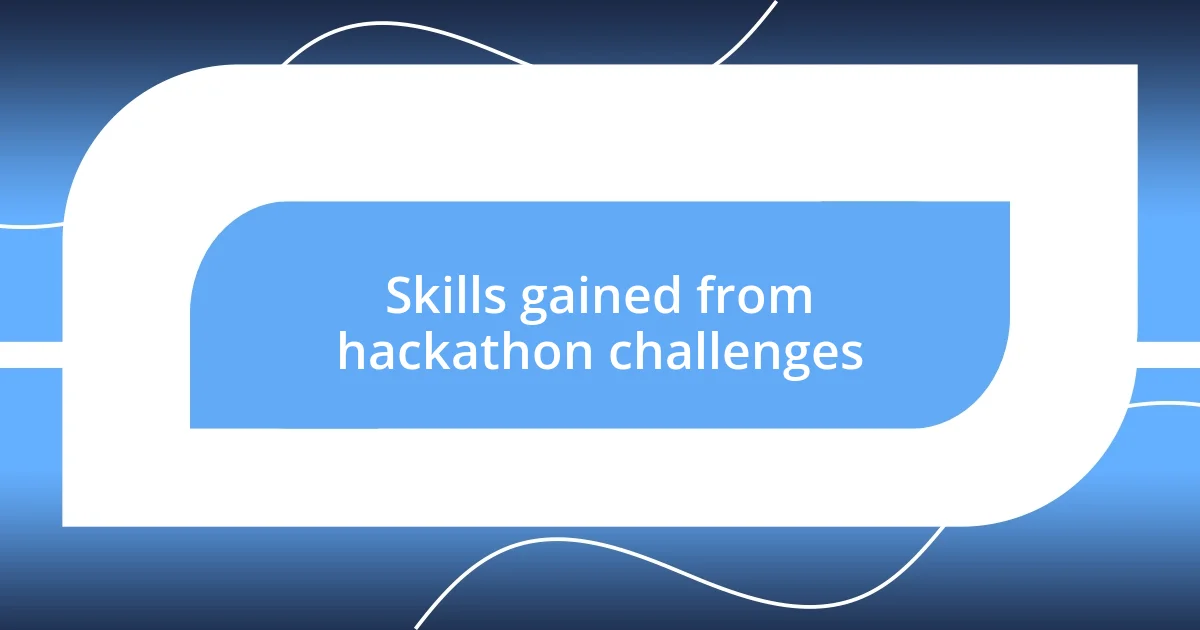
Skills gained from hackathon challenges
The skills gained from hackathon challenges are vast and varied, transforming participants into more well-rounded individuals. I remember a particular challenge where we had to prototype an idea within hours. This experience honed my time management skills and taught me to prioritize tasks effectively under pressure. It felt like a rush, channeling all my focus to meet deadlines while also ensuring quality. The ability to think on my feet became a game-changer in many aspects of my life, not just during hackathons.
In addition to time management, I developed strong problem-solving skills. Many hackathons present unexpected obstacles; I experienced this firsthand when our app crashed during a demo. The immediate need to troubleshoot ignited a sense of determination within me. I found that collaborating quickly with my teammates allowed us to brainstorm solutions efficiently. Here’s a quick list of key skills that I refined through participating in hackathons:
- Adaptability: Learning to pivot when plans change rapidly.
- Collaboration: Working seamlessly with diverse skill sets and personalities.
- Technical Proficiency: Gaining hands-on experience with new tools and technologies.
- Presentation Skills: Articulating our work clearly and engagingly to judges.
- Critical Thinking: Analyzing problems under pressure and developing actionable solutions.
These skills have not only enhanced my performance during hackathons but have also enriched my daily professional interactions.
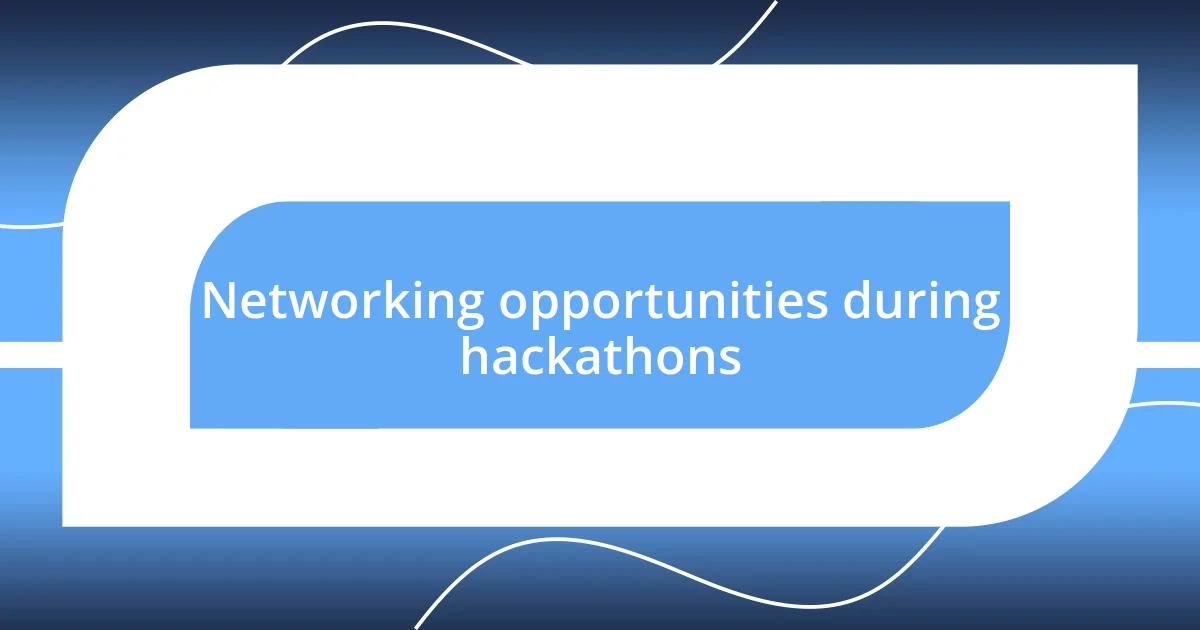
Networking opportunities during hackathons
During hackathons, I’ve discovered that networking can happen in the most unexpected moments. At one event, I found myself standing next to a fellow competitor while waiting for the elevator. What started as a casual chat about our projects turned into a discussion that led to collaboration on future ideas. Isn’t it fascinating how a simple conversation can open doors? Those spontaneous interactions are often the most memorable and impactful.
Another networking advantage I’ve experienced is the mentorship that emerges organically. During a late-night coding session, I noticed a seasoned developer helping a newcomer troubleshoot an issue. I approached them, and in that instant, I built a relationship that blossomed into a mentorship. Sharing tips and insights with someone who’s navigated the same challenges can be incredibly encouraging. It’s like having a guide in a complex landscape, which can truly boost your confidence!
Lastly, attending hackathons has allowed me to connect with industry professionals in a relaxed setting. While enjoying a cup of coffee, I had an enlightening discussion with a judge who was also a lead engineer at a well-known tech company. Not only did I receive invaluable feedback on my project, but we exchanged contact information, which later led to an internship opportunity. Can you see how such informal settings can foster meaningful connections? I firmly believe this kind of environment nurtures bonds that extend far beyond the hackathon scenario.
| Networking Opportunities | Examples |
|---|---|
| Spontaneous Conversations | Meeting fellow participants in elevators or during breaks |
| Mentorship Relationships | Learning from experienced developers during coding raids |
| Connections with Industry Professionals | Engaging with judges and guests in informal settings |
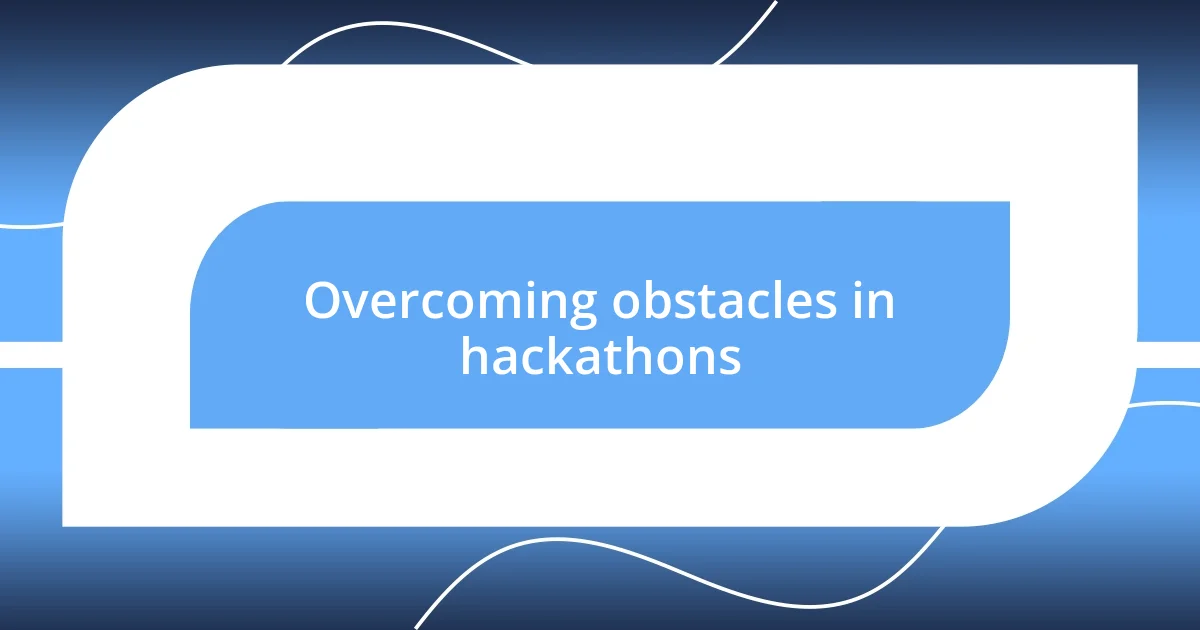
Overcoming obstacles in hackathons
One of the biggest lessons I learned in hackathons is how to face and overcome unexpected hurdles. I vividly remember a situation where our team’s internet connection dropped during a crucial phase. Panic set in initially; we had limited time left! However, instead of spiraling, we took a collective breath and broke into smaller groups. This allowed us to brainstorm offline and devise a backup plan. It was a moment of sheer grit—sometimes, the stress can actually fuel creativity if you allow it to.
Another obstacle I frequently encountered was communication breakdowns within diverse teams. In one hackathon, our group had members with different expertise levels and backgrounds, leading to confusion over tasks. I realized that taking the initiative to clarify roles and encourage open dialogue made a world of difference. By establishing clear communication channels early on, we transformed our initial chaos into a well-oiled machine. Have you ever noticed how clarity in discussion can shift the entire team dynamic to a more productive state?
Lastly, managing my own expectations was another challenge. There were times I felt overwhelmed by the pressure of the competition and the desire to produce perfection. I learned that embracing imperfections and viewing setbacks as learning opportunities made the experience far more enriching. I recall a moment when our project didn’t turn out as planned, but instead of feeling defeated, I was motivated to analyze what went wrong and how I could improve next time. It taught me resilience and the importance of a growth mindset—two tools I carry with me beyond hackathons.
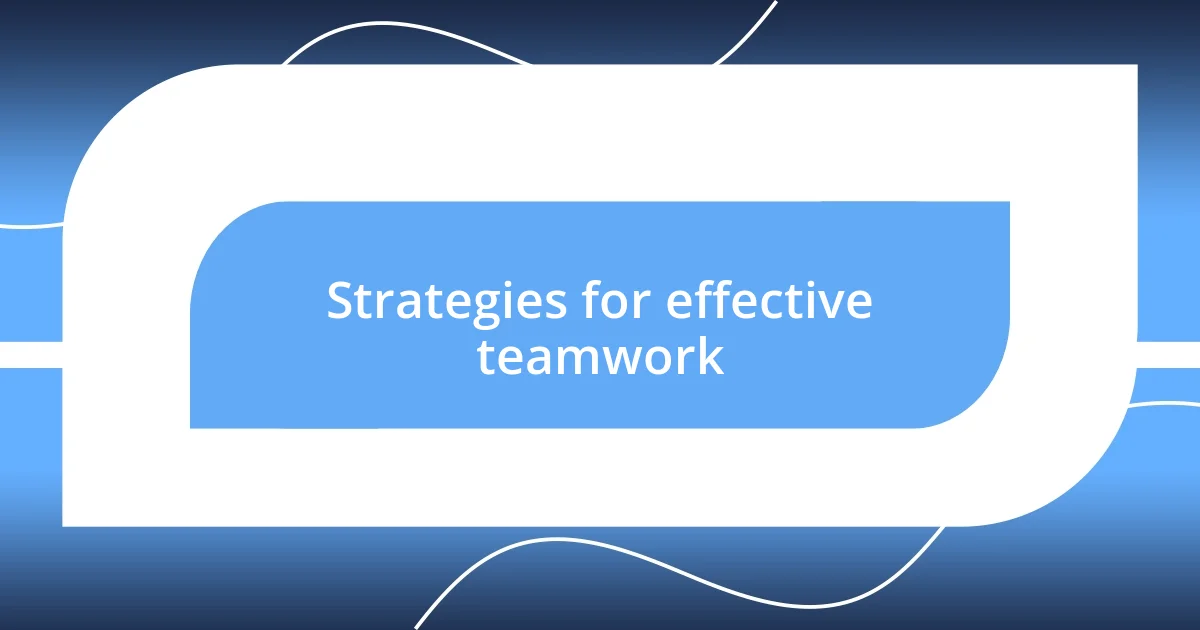
Strategies for effective teamwork
Effective teamwork in hackathons is crucial, and I’ve found that establishing clear roles can significantly enhance collaboration. During one particularly intense event, I took the lead on organizing tasks based on everyone’s strengths, which not only made us more efficient but also created a sense of ownership within the team. Isn’t it amazing how a little clarity can spark enthusiasm? When everyone knows what they are responsible for, it lessens confusion and boosts morale.
Another strategy I’ve seen work wonders is fostering an environment where all ideas are welcomed—big or small. In the heat of one hackathon, I encouraged team members to share even the wildest concepts without judgment. This openness led to an unexpected breakthrough: someone suggested an off-the-wall feature that ultimately became a core element of our project. I often think, how often do we stifle creativity by fearing judgment? Embracing diverse perspectives really can unlock unique solutions.
Lastly, taking time for team check-ins throughout the event has been invaluable. I remember a particular hackathon where we paused for brief discussions every few hours to assess our progress and feelings. This practice not only kept everyone aligned but also built camaraderie. Have you ever felt that rush of teamwork when you’re all on the same page? There’s something incredibly empowering about sharing victories and struggles, and it lays a solid foundation for collaboration moving forward.
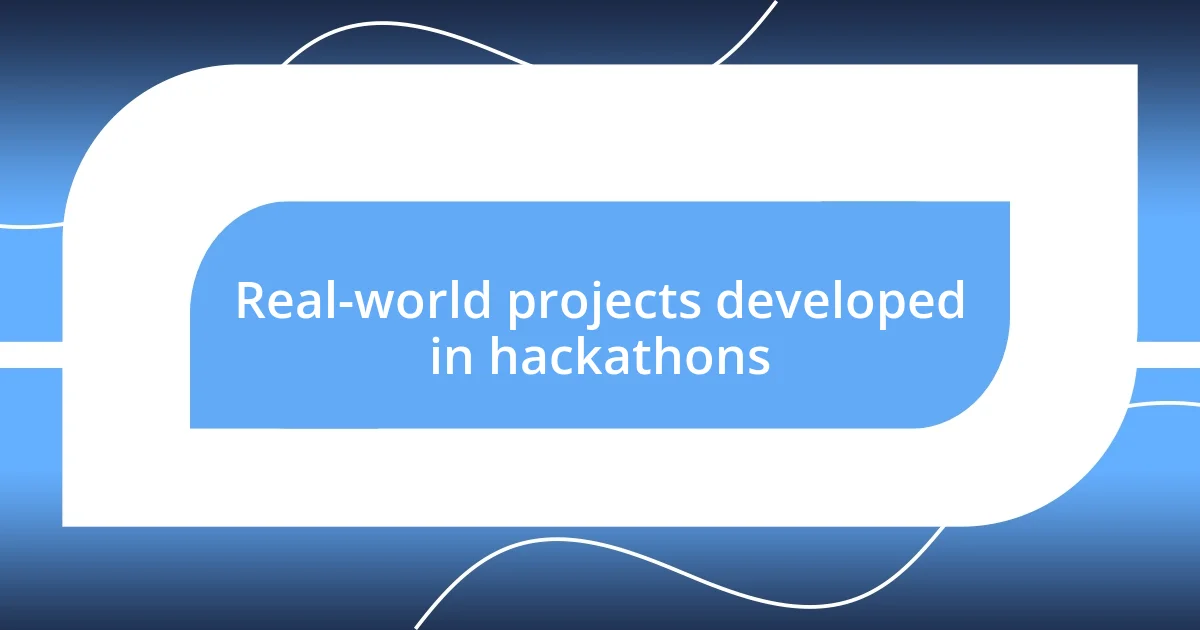
Real-world projects developed in hackathons
Working on real-world projects during hackathons has been a transformative experience for me. One memorable project involved developing a mobile app that helped users locate nearby mental health resources. I remember the moment we received feedback from actual users. It was incredibly rewarding to see how our efforts could impact real lives. Have you ever felt that sense of purpose when your work resonates with people? It’s truly powerful.
Another project sticks out in my mind—a web platform aimed at facilitating remote learning for underserved communities. Collaborating with teammates whose backgrounds varied from education to engineering opened a world of ideas. I discovered that pooling different perspectives can lead to innovative solutions. In our case, blending tech prowess with a deep understanding of educational needs resulted in features that made the platform more intuitive and user-friendly. I often reflect on how diversity fuels creativity, making every project more enriching.
One of the standout aspects of building these projects was the iterative process. In one hackathon, we developed a prototype for a sustainable food-sharing app and faced significant challenges in deployment. Instead of viewing setbacks as failures, we embraced them as teaching moments. With each iteration, our solution not only improved but also became more aligned with user needs. It’s fascinating to consider how failure can actually guide you toward a more polished end product, isn’t it? It highlighted the importance of adaptability and resilience, traits I now carry into every project I undertake.


